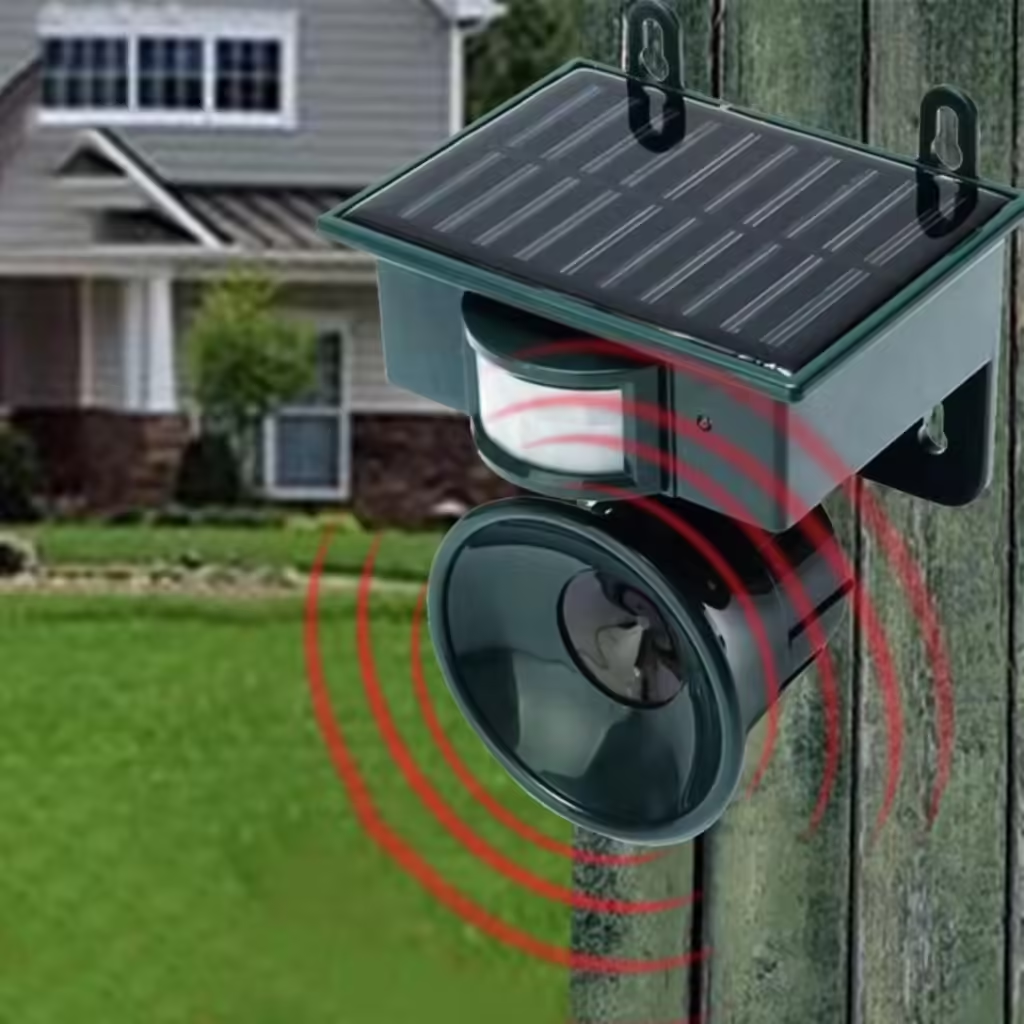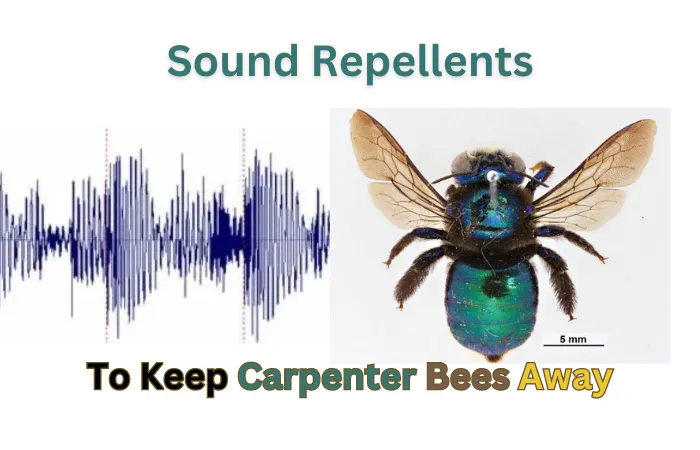Carpenter bees are not your average pollinators—they can cause significant damage to wooden structures. As homeowners and gardeners look for eco-friendly ways to repel these persistent pests, one question often arises: Can sound noise keep carpenter bees away?
This article dives deep into the science behind sound repellents, exploring whether they are effective in deterring carpenter bees from nesting in your wooden deck, fences, or garden structures. We’ll also examine the pros and cons of sound devices, compare them to traditional methods, and provide practical advice on protecting your property.
How Sound Repellents Work ?
Sound repellents are designed to emit high-frequency noises that are generally inaudible to humans but can disturb pests. The idea is that these sound waves irritate or confuse insects, deterring them from staying in the area. But how do sound repellents interact with carpenter bees specifically?
The Science of Ultrasonic Repellents
Most sound repellents for insects use ultrasonic frequencies—above 20,000 Hz—which are beyond the range of human hearing. Theoretically, these high-pitched sounds interfere with an insect’s nervous system, making it difficult for them to communicate, navigate, or maintain their sense of safety.
Carpenter bees rely on sensory cues, such as vibration and sound, to locate optimal nesting sites. Some believe that introducing high-pitched noise into their environment disrupts this process, making wooden structures less attractive for nesting.
However, research on the effectiveness of sound repellents for carpenter bees remains limited. Most studies focus on general insect repellents, with conflicting conclusions about their overall success. The specific biology and behavior of carpenter bees may also influence how they respond to sound stimuli.
Research and Evidence: Does Sound Really Repel Carpenter Bees?
Although ultrasonic sound repellents have been successful in deterring some insects—such as mosquitoes and rodents—their effectiveness on carpenter bees is not widely supported by scientific evidence. Here are some factors to consider:
- Carpenter Bee Nesting Behavior: Unlike termites or ants, carpenter bees do not live in colonies. They tend to nest individually or in small groups, making it harder for sound devices to consistently impact an entire population.
- Wood Boring Tendencies: Carpenter bees are highly motivated by the need to bore into wood for nesting, often overriding environmental discomfort. If the wood meets their nesting criteria, the bees may endure the sound or find a quieter area nearby.
In short, while sound repellents may temporarily disturb carpenter bees, they are not a foolproof method to keep them away permanently. Homeowners looking for more reliable solutions might consider combining sound devices with other deterrents.
DIY Sound Repellents: Can You Make Your Own?
For those curious about trying sound-based repellents at home, there are several DIY options to consider:
- Portable Bluetooth Speakers: Some homeowners place speakers near nesting sites and play high-pitched noises. While not as targeted as ultrasonic devices, this method is easy to implement and can cover larger areas.
- Ultrasonic Pest Repellent Devices: Many ultrasonic repellent devices can be purchased online and claim to deter pests, including bees, mosquitoes, and rodents. These devices typically plug into electrical outlets and emit continuous high-frequency sounds.
- Sound-Generating Apps: Some mobile apps are designed to emit high-pitched sounds that might deter insects. However, their effectiveness on carpenter bees has not been proven, and the sound range may be too small to cover outdoor areas.
While these methods might show some success in keeping bees at bay, results are likely to vary depending on the specific environment and level of infestation. Homeowners should be prepared to experiment and use sound as part of a broader pest management strategy.
Commercial Sound Devices: What’s Available?
If DIY isn’t your style, there are commercial sound repellents that promise to repel pests, including carpenter bees. Here’s a look at some of the options:
1. Ultrasonic Pest Repellers
Ultrasonic devices are widely available and are marketed as being effective for a variety of insects, including carpenter bees. These devices plug into an electrical outlet and emit a continuous sound that, in theory, disrupts the bees’ nesting habits. However, reviews are mixed—with some users reporting success and others noticing no change in bee activity.
2. Solar-Powered Sound Repellents

For outdoor use, solar-powered sound repellents are a more eco-friendly option. These devices recharge through sunlight, ensuring they emit sound continuously without the need for electricity. They may be effective in gardens, patios, or decks where carpenter bees tend to hover. Again, results vary, and many users report needing additional deterrents to see noticeable effects.
3. Multi-Frequency Devices
Some repellents offer variable frequencies, claiming to prevent carpenter bees from adapting to the sound over time. These devices switch between different sound ranges to keep pests guessing, but they come at a higher cost and are not guaranteed to work on all species.
Myths vs. Reality: Debunking Sound Repellent Myths
There are a few misconceptions surrounding sound repellents and their ability to keep carpenter bees away. Let’s set the record straight.
- Myth 1: Sound Repellents Work Instantly
Reality: Sound repellents may take time to affect carpenter bees, if at all. If bees have already started nesting, sound may not be enough to drive them away immediately. - Myth 2: All Bees Respond to Ultrasonic Sounds
Reality: Not all insects or bees are equally sensitive to sound waves. Carpenter bees may tolerate higher sound frequencies better than other pests like mosquitoes. - Myth 3: Sound Alone Will Solve the Problem
Reality: Sound repellents are best used as part of a broader pest management strategy. Combining sound devices with other methods, like natural repellents or sealing off entry points, can improve your chances of keeping carpenter bees away.
Resources
For those looking to learn more about carpenter bee prevention and sound repellents, here are some useful resources:
- Bee Identification and Behavior:
University of Kentucky – Carpenter Bees
Penn State Extension – Carpenter Bees - Pest Control Products:
Eco Defense – Ultrasonic Pest Repellent
Home Remedies – Natural Repellents - Scientific Articles:
Effectiveness of Ultrasonic Devices on Pests
Carpenter Bees: Myths and Facts
FAQs
1. Do sound repellents work for carpenter bees?
Sound repellents may temporarily disturb carpenter bees, but they are not guaranteed to drive them away entirely.
2. What frequency repels carpenter bees?
Most commercial sound repellents emit ultrasonic frequencies above 20,000 Hz. However, there is limited evidence to support their consistent effectiveness on carpenter bees.
3. Are there eco-friendly alternatives to sound repellents for carpenter bees?
Yes, natural solutions like citrus oil, almond oil, or vinegar can deter carpenter bees. Sealing wood and keeping surfaces painted or stained also helps.
4. Can carpenter bees get used to sound repellents over time?
Some studies suggest that pests can become accustomed to ultrasonic devices, making them less effective over time. Multi-frequency devices may prevent this adaptation.
5. Is sound a humane method to deter carpenter bees?
Sound repellents are considered humane since they do not harm bees physically, only creating an uncomfortable environment that encourages them to leave.
Conclusion
While sound repellents are an intriguing, eco-friendly option for keeping carpenter bees away, they should not be relied upon as the sole solution. Their effectiveness varies, and they are best used in combination with other preventative measures, such as painting wood, sealing holes, or using natural repellents.
If you’re dealing with a severe infestation, professional pest control may be necessary to fully protect your wooden structures. In the meantime, experimenting with sound-based repellents could add another layer of protection to your home and garden. Have you tried using sound to repel carpenter bees? Share your experience with us in the comments!



